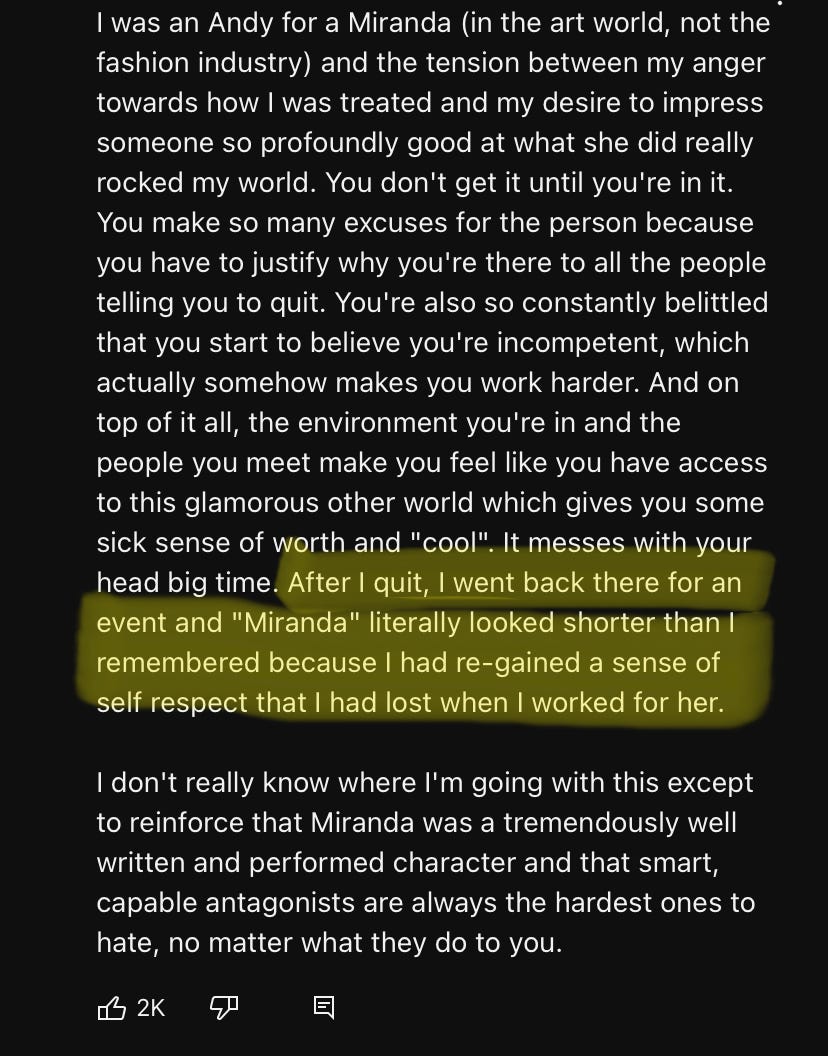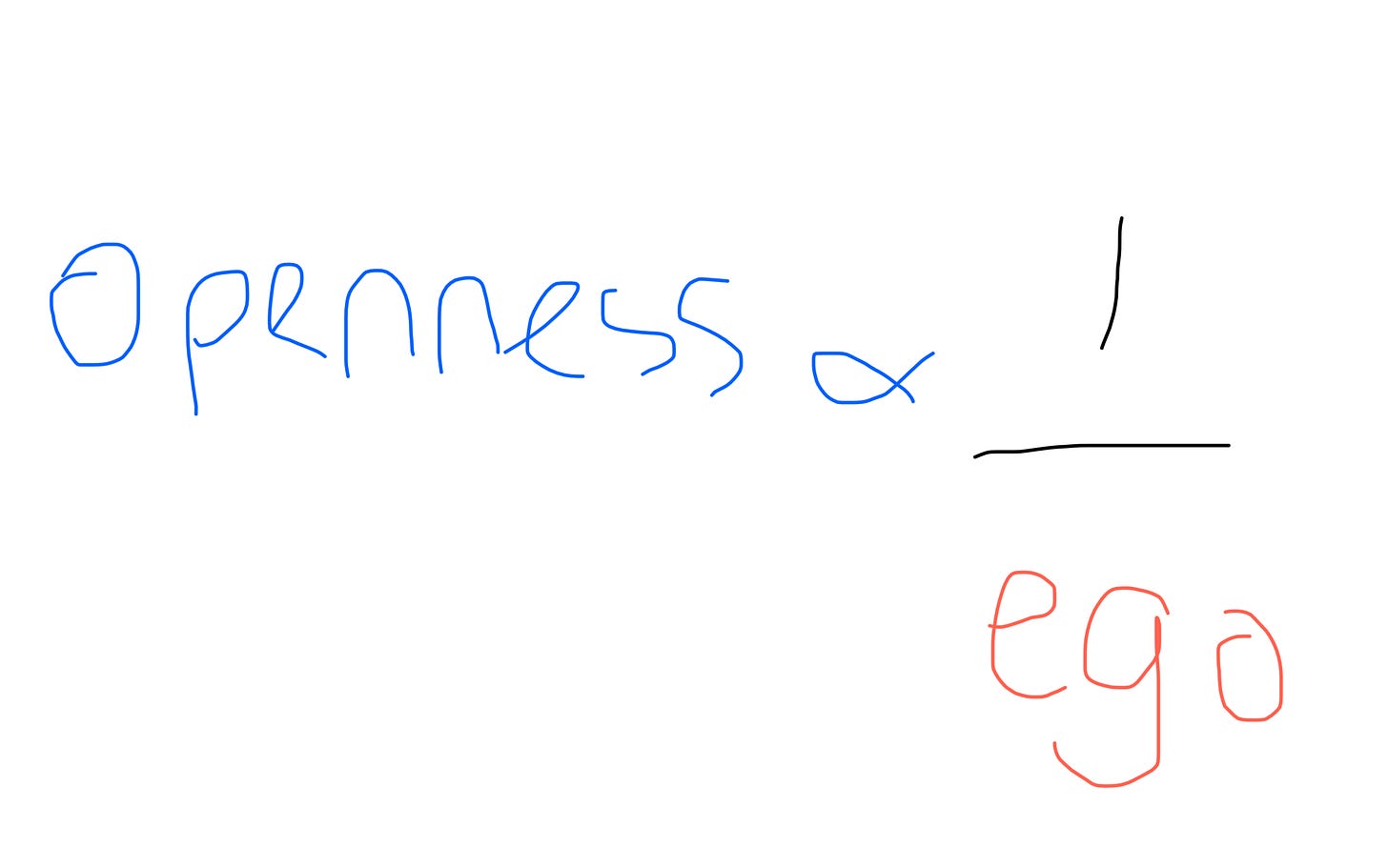I have recently grown much more sensitive to the magnitude of the egos around me. Meaning: what previously struck me as questionable behaviour I now see as the ego’s bid for attention. I also see behaviour I used to view as an indicator of good character for what it really is: a product of humility, or low ego.
a little background
As I have gone deeper inwards, I noticed how many of my (small) decisions were unconscious bids for… attention? acknowledgement? reverence? respect? status? a social currency of some kind. Importantly: this was not being done consciously. My ego was gripping my mind and posturing the identity it wanted to portray to the world. This phenomenon was invisible to me until I learned to earnestly examine myself. I would say something that gave me pause and ask myself: did I just say that for attention? Am I trying to make this person think I’m smart? Why am I doing that? I’m pretty sure this is the kind of self-examination Kendrick was referring to when he said:
“Some put it on the devil when they fall short,
I put it on my ego, the lord of all lords”
To stop unconsciously making ego-fuelled decisions, I needed to decouple my sense of self from the identity I was presenting to the world. Or said more simply: I needed to contract my ego. I needed to internalize that I was a vessel for what is inside me, and whatever is inside me does not make me superior or inferior to anyone else. We are all full of potential that is busting at the seams—that potential, while unique, does not make one person better or worse than another. When I have a handle on my ego, I am focused on exploring the potential of others instead of exposing my own. I do not feel compelled to compare or prove myself to anyone.
people as mirrors
The effect of greater ego awareness has been greater humility around my own faults. When someone agitates me, instead of judging them, I now scan myself for the behaviour that bothered me, asking: do I do that myself? The answer is almost always yes, I have done it before or, even more likely, I often do whatever bothered me.
Tangibly, this means that instead of saying “I can’t believe this person would do this,” I now defer to “when have I done something similar to this?” or, “what would compel me to act this way?” This instantly breeds compassion, as I recognize that I have been there myself! I don't feel above them because I noticed their “bad behaviour.” The opposite: I see that we are equal because of it. This reflection heightens my curiosity for where that person is coming from, prompting me to lead with the empathy I would want extended to me if our roles were reversed (it turns out the path to “love thy neighbour as you love thyself” is really just good old-fashioned humility). Compassion grounds you in your humanity instead of letting your ego take the easy way out: judgement and superiority, “I would never do what they did”—hint: you could, you might, you probably have.
humility as a manifestation of low ego
Humility is understanding that we all err, we are all flawed, and fundamentally, we are all equal. Not equal in the sense that we will all do the same things, but equal in that no one should be treated or perceived as “less than”, or whatever label the ego reaches for to affirm its superiority.
To me, that is the definition of humility: knowing you are intrinsically no better (or worse) than anyone else. That you are capable of, and at times guilty of, nearly everything that bothers you in others. That you are blessed if you get to fully explore your potential, but that any expression of it does not make you superior or inferior to anyone else. Humility is viewing yourself as more connected to others than you are separate from them—it is viewing others as an extension of you.
When you internalize these principles, you begin to see yourself in others. It becomes more challenging to get angry at others, because you would implicitly be lashing out at yourself. It becomes harder to act above others, because that would require you to put down a part of yourself. The thought of manipulating or controlling someone feels ludicrous, because you would never consent to being controlled or manipulated yourself.
hubris as a manifestation of high ego
The inverse of humility is hubris: excessive pride. Narcissism, self-obsession, self-importance, viewing oneself as above others, failing to acknowledge one’s own errors while mindlessly criticizing the short-comings of others. High ego individuals become increasingly intolerable as your ego shrinks, because you see through their bids for attention instead of competing with them. Their inability to recognize their own complicity in what bothers them becomes excruciatingly obvious.
You often hear someone like this complaining about someone, saying “I would never do that.” If you know them well, you’re probably thinking: but you would, and you have. As we all do! As you probably have, too. This is what I mean: when your ego blinds you to how others are only a reflection—an extension—of you, you think their behaviour has nothing to do with you. But why would you be so bothered unless it poked at an internal sore spot of yours?

High ego people will often self-identify as “alpha”-types. They believe (whether consciously or unconsciously) that they should make decisions for others. They think their judgement is superior. They think they know others better than those individuals know themselves. They make assumptions about others’ behaviour without consulting them (or exercising compassion for where that behaviour might come from). They curate and polish their image, maintaining a tight grip on how others perceive them. They chase virtue and status, and—if they are clever—subtly express said virtue and status in faux-humble ways, where they lead you to the questions that tease it out of them, pseudo-reluctantly expressing the ways in which they think they are better than others. If they’re not clever, they will be blatantly and obnoxiously attention-seeking, which is much easier to spot and thus less effective at drawing others in.
These might sound like obvious red flags, but they are more subtle than you’d expect, and oddly compelling if you have not examined yourself for these behaviours. Because when you are absorbed in your ego, you are unconsciously competing with these people—or worse: you feel “lucky” to be around someone who exudes so much confidence, self-belief, dominance. You perceive them to be superior to you, and thus believe being in their presence somehow increases the value of your own. You don’t want to disappoint them. You don’t want to offend them. You don’t want to upset them. They are the kind of person that punishes people who “betray” them (betrayal = acting out of alignment with their standards). They want to be revered, and anyone who doesn't revere them gets iced out, often causing that person to seek their attention or approval even more intensely. You can become so absorbed in trying to please them that you do not notice how they are negatively affecting you. This causes you to start making sacrifices around your own values. If this sounds toxic, that’s because it is. High ego people radiate a seductive, yet volatile energy that always keeps you on edge, preventing you from ever feeling at ease around them.
ego litmus test: do you do things for this person out of fear or love?
Relationships with high ego people are fear-based, instead of love-based. High ego people intimidate you with their dominance and apparent self-assuredness. You do things for them because you’re scared of what will happen if you don’t. Disappointing them is more costly from an energy perspective than communicating and standing for your needs. This is why relationships with these people tend to be so asymmetrical: when one person has power over the other, they can get that person to do a lot for them while doing very little to reciprocate. This familiarizes high ego people with those around them being obedient, falling in line, not over-stepping. The dynamic works because they exude so much confidence. Their ego paradoxically frees them to act inappropriately while going unchecked, because their inner circle is probably too intimidated to call them out.
High ego people get frustrated and confused when they interact with secure, low ego people who don’t fall for the ruse. They cannot understand why that person is not treating them like everyone else (bending a knee, trying to please them). So, they get controlling, or insecure, or both. They grip onto low ego, secure people even more tightly because of their unwillingness to comply. If you opt out of the dynamic they are used to, you quickly become a target for negative energy. If you ever find yourself in a situation like this, it’s important to distance yourself from this kind of person as soon as you become aware of it, because the dynamic only becomes more insidious the longer it persists.

ego dynamics warp reality
I was in a rather interesting YouTube rabbit hole the other day, watching videos psychoanalyzing the characters from the Devil Wears Prada (lol). For those who haven’t seen it, the movie pivots around Miranda Priestly, a high-powered, egotistical and narcissistic magazine editor and her assistant, Andy, who exists in her shadow and is tortured by her boss’ near-impossible requests that show little awareness for her humanity. She is treated as less-than and regularly reminded of her inferiority.
My eyelids hung heavy as I fell one video too deep into this content free-fall when I stumbled upon a comment that woke me up. It detailed a woman’s real life experience that mirrored the dynamic between Miranda and Andy in the movie. What especially struck me was her warped physical perception of this high ego person from the above-below dynamic that existed between them:
It’s a good reminder that you usually cannot see how deep you are in the throes of a dynamic like this until you step back and see your perception of the person change. You become more resistant to their exertion of superiority, because you have developed a sense of self-worth independent of them. When you are too close to someone like this, they take a piece of your power by convincing you to prioritize their needs over yours. This is an incredibly dangerous dynamic to entertain.
low ego people let you exist, high ego people control your existence
Someone recently said to me that people ultimately trend towards choosing low ego people. This is because low ego people give you the space to breathe—to exist in a relationship without a sense of duty, obligation, or debt. It never feels like you owe them anything. The space you share feels light, easy, safe.
Relationships with high ego people feel the opposite: heavy, dutiful, volatile. If you stay in these relationships long enough, your sense of self wanes, because you stake a portion of how you see yourself in their perception of you. You let them control you—subtly—by making choices in anticipation of how they will react, by putting their wants over your needs. This is no way to be! When you surround yourself with low ego people, you still need to be a good friend, but you do not need to worry about them taking benign actions personally. The relationship feels airy, playful, equal.
finding low ego people is a 2-player game
If you want to be around low ego people, you need to shrink your ego, too. You need to not take things personally. You need to give your friends the benefit of the doubt. You need to respect other people’s space, time, needs, and not expect others to prioritize your wants over theirs. You need to treat everyone like they are important, just as you are yourself (viewing everyone as important is an extension of viewing everyone as equal, and everyone’s potential as unique). You need to be curious about others. You need to resist the urge to “fix” or “change” people. You can lead by example—the most powerful way to influence people!—but you cannot pressure or actively try to change how others act. This is a form of control and is inherently egoic. You may think you are doing this from a place of virtue (and you might genuinely be), but even then, trying to change someone can muddy a relationship and implies a level of dominance that does not really have a place in a social relationship (there are probably exceptions to this in extreme cases, but I’m speaking on the general here).
the ego wants to survive
Low ego is not an end-state, but a continuous process. Our ego is a living, breathing thing, squirming around inside you as you read these words and overlay them onto your life, trying to figure out if you are high or low ego. In some sense, we make everything about us—our self image is the lens of our life, after all. But if we want to go through life with grace and openness, we need to be conscious of our ego and resist its efforts to constantly take the reins. If we fail in doing so it is us who suffers most, because we attract the energy we exude. Like all positive changes, lowering your ego yields a virtuous cycle:
The lower ego you are, the stronger a magnet you become for low ego people.
The more exposure you have to low ego people, the lower your ego tolerance becomes.
The lower your ego tolerance, the easier it is to shed high ego people from your life.
The fewer high ego people in your life, the more you need to keep your own ego in check.
As this cycle repeats, you develop a standard for the level of ego you will accept (why hang out with someone who tries to control how you feel when you can hang out with someone who creates space for you to feel your true feelings?)
Life is simply better around low ego people. You feel more at ease, more yourself, more free to be you, instead of feeling constrained by who you feel you need to be for high ego people. It’s worth noting that you should not view high ego people as “bad.” We should develop compassion for the fact that they, too, are acting from a place of fear: fear of losing power, status, control. Fear rooted in insecurities and experiences invisible to us. Their inability to treat others with love and compassion is only a byproduct of their inability to treat themselves with those same things (because how we treat others is an extension of how we treat ourselves!). So: develop compassion—not resentment!—for the fact that they have not given themselves the space to untangle their high ego behaviour. They have work to do and humility to develop, which you can feel empathy for, while simultaneously choosing not to be around that process as it transpires.
openness as a function of ego
Dismantling our ego is a slow, iterative process of developing awareness and de-bugging the thoughts that bubble up when we are in our mind and out of the moment. As your ego shrinks, it becomes even more important to curate your environment. While you can hold space for anyone, it’s most enriching to be around people who can reciprocate the love, trust, and openness found in low ego connections. As your ego shrinks, your energy becomes more easily influenced by those around you, because openness is inversely proportional to ego size:
All this means is:
The bigger your ego, the more closed off you are.
The lower your ego, the more open you are.
As you contract your ego, surround yourself with the energy you want to absorb. Because once you’ve opened yourself up, whatever is around you is what will flow in.
Note: Part 2 of this essay will double click on the relationship between embracing openness and curating your environment.
Do you resonate with what I write about? Maybe we should work together: If you resonate with the ideas I write about and want to cultivate a life you genuinely enjoy living, where you align your actions with your values, move towards the changes you know you want to make, and consciously harvest self-knowledge in the process, send an email to isabel@mindmine.school or to isabel@mindmine.school or DM me on Twitter to explore what working together 1-1 would look like.
PS—If you read all that, you might enjoy my Twitter, where I share short-form versions of these ideas. You might also like a piece I wrote about self image.






A powerful read, helping me to untangle the story that I’ve been telling myself about people around me. It hits hard when you realize that you’re projecting your own ego states towards others and fail look into yourself.
I always come back to what you aptly pointed out - that people are mirrors for us. what bothers us, what we overanalyze and judge in other people actually says more about us than them. When we untangle the ego, we have a lot more distance to see our actions as a whole not just up close. beautiful piece <3